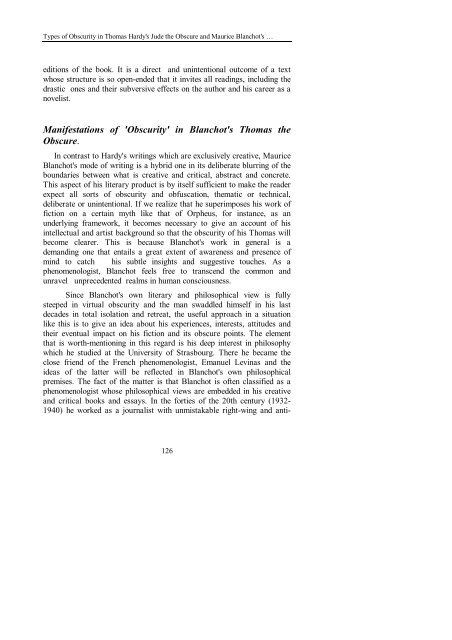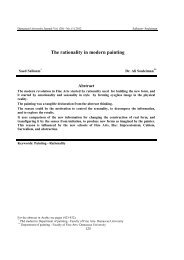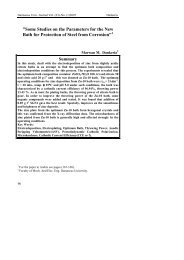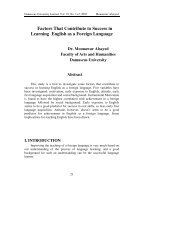Types of Obscurity in Thomas Hardy's Jude the Obscure and ...
Types of Obscurity in Thomas Hardy's Jude the Obscure and ...
Types of Obscurity in Thomas Hardy's Jude the Obscure and ...
You also want an ePaper? Increase the reach of your titles
YUMPU automatically turns print PDFs into web optimized ePapers that Google loves.
<strong>Types</strong> <strong>of</strong> <strong>Obscurity</strong> <strong>in</strong> <strong>Thomas</strong> <strong>Hardy's</strong> <strong>Jude</strong> <strong>the</strong> <strong>Obscure</strong> <strong>and</strong> Maurice Blanchot's …editions <strong>of</strong> <strong>the</strong> book. It is a direct <strong>and</strong> un<strong>in</strong>tentional outcome <strong>of</strong> a textwhose structure is so open-ended that it <strong>in</strong>vites all read<strong>in</strong>gs, <strong>in</strong>clud<strong>in</strong>g <strong>the</strong>drastic ones <strong>and</strong> <strong>the</strong>ir subversive effects on <strong>the</strong> author <strong>and</strong> his career as anovelist.Manifestations <strong>of</strong> '<strong>Obscurity</strong>' <strong>in</strong> Blanchot's <strong>Thomas</strong> <strong>the</strong><strong>Obscure</strong>.In contrast to <strong>Hardy's</strong> writ<strong>in</strong>gs which are exclusively creative, MauriceBlanchot's mode <strong>of</strong> writ<strong>in</strong>g is a hybrid one <strong>in</strong> its deliberate blurr<strong>in</strong>g <strong>of</strong> <strong>the</strong>boundaries between what is creative <strong>and</strong> critical, abstract <strong>and</strong> concrete.This aspect <strong>of</strong> his literary product is by itself sufficient to make <strong>the</strong> readerexpect all sorts <strong>of</strong> obscurity <strong>and</strong> obfuscation, <strong>the</strong>matic or technical,deliberate or un<strong>in</strong>tentional. If we realize that he superimposes his work <strong>of</strong>fiction on a certa<strong>in</strong> myth like that <strong>of</strong> Orpheus, for <strong>in</strong>stance, as anunderly<strong>in</strong>g framework, it becomes necessary to give an account <strong>of</strong> his<strong>in</strong>tellectual <strong>and</strong> artist background so that <strong>the</strong> obscurity <strong>of</strong> his <strong>Thomas</strong> willbecome clearer. This is because Blanchot's work <strong>in</strong> general is adem<strong>and</strong><strong>in</strong>g one that entails a great extent <strong>of</strong> awareness <strong>and</strong> presence <strong>of</strong>m<strong>in</strong>d to catch his subtle <strong>in</strong>sights <strong>and</strong> suggestive touches. As aphenomenologist, Blanchot feels free to transcend <strong>the</strong> common <strong>and</strong>unravel unprecedented realms <strong>in</strong> human consciousness.S<strong>in</strong>ce Blanchot's own literary <strong>and</strong> philosophical view is fullysteeped <strong>in</strong> virtual obscurity <strong>and</strong> <strong>the</strong> man swaddled himself <strong>in</strong> his lastdecades <strong>in</strong> total isolation <strong>and</strong> retreat, <strong>the</strong> useful approach <strong>in</strong> a situationlike this is to give an idea about his experiences, <strong>in</strong>terests, attitudes <strong>and</strong><strong>the</strong>ir eventual impact on his fiction <strong>and</strong> its obscure po<strong>in</strong>ts. The elementthat is worth-mention<strong>in</strong>g <strong>in</strong> this regard is his deep <strong>in</strong>terest <strong>in</strong> philosophywhich he studied at <strong>the</strong> University <strong>of</strong> Strasbourg. There he became <strong>the</strong>close friend <strong>of</strong> <strong>the</strong> French phenomenologist, Emanuel Lev<strong>in</strong>as <strong>and</strong> <strong>the</strong>ideas <strong>of</strong> <strong>the</strong> latter will be reflected <strong>in</strong> Blanchot's own philosophicalpremises. The fact <strong>of</strong> <strong>the</strong> matter is that Blanchot is <strong>of</strong>ten classified as aphenomenologist whose philosophical views are embedded <strong>in</strong> his creative<strong>and</strong> critical books <strong>and</strong> essays. In <strong>the</strong> forties <strong>of</strong> <strong>the</strong> 20th century (1932-1940) he worked as a journalist with unmistakable right-w<strong>in</strong>g <strong>and</strong> anti-126
















